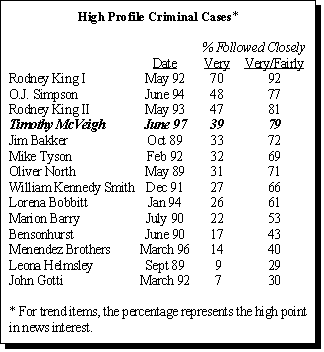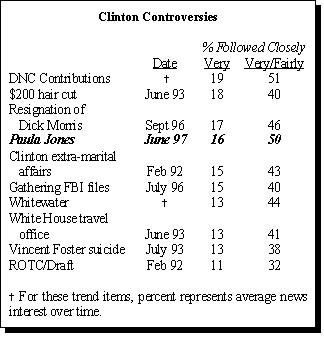Survey Findings
Pew’s latest News Interest Index finds that a little bit of news about Medicare reform travels a long way, while a lot of news about tax relief is mostly greeted with shrugs and disbelief. Fewer than four in ten Americans (38%) paid close attention to the ongoing Washington debate about how to cut taxes as part of the budget agreement. But fully 51% reported closely following news about proposed changes to the Medicare system, which received much less coverage until Senate Finance Committee recommendations were unveiled late last week.
Lack of interest in news about cutting taxes reflected a disturbingly cynical view by Americans: 90% believe the average citizen will pay more taxes in the year 2000, rather than less (7%), despite the recent bipartisan agreement on the budget. And the public is divided over who has the best ideas for cutting middle class taxes: Republican Congressional leaders (30%), Democratic Congressional leaders (23%), or President Clinton (18%).

On the other hand, the public expressed much clearer preferences about the Medicare reform proposals made last week. Nearly two in three (60%) favor increasing costs for affluent Medicare users, while just one in three support gradually raising the age of eligibility as a way of keeping the program financially sound for future generations. Surprisingly, the means-test option is, if anything, supported more strongly by people over 50 than by younger Americans.
Politically, approval ratings of GOP leaders in Congress have fallen to 33% from 40% in May, in the wake of the party’s perceived mishandling of the disaster relief bill. The President’s approval ratings, in contrast, remain in the mid-50s, as news about Paula Jones’ court victory attracted no more public interest than have other Clinton scandal stories, according to the Pew poll of 1,000 respondents June 18-22.
Medicare

Support for means-testing Medicare recipients is receiving strong support from the public. Fully 60% favor requiring persons who earn more than $50,000 a year and couples who earn over $75,000 annually, to pay a larger share of their doctors’ bills. Support is strong among Democrats, Republicans and Independents and across age groups.
Older Americans with annual incomes of $50,000 or more are somewhat less supportive of the means-testing proposal, likely to affect them directly. Nonetheless, a majority (56%) of this group favor requiring more affluent seniors to pay more.
The proposal to increase the eligibility age for Medicare from 65 to 67 is far less popular. Only 33% favor the idea of a gradual increase in the age at which seniors become eligible for Medicare; of them, 13% “strongly favor” this proposal. Those already 65 and over would be unaffected personally by this change and are more supportive of it than are other age groups; 43% favor the age increase. But only 26% of those 50 to 64, and thus approaching retirement age, favor the change. Better educated and wealthier Americans have a more favorable view of this proposal, as do Republicans much more so than Democrats (42% vs. 26%).
Taxes and Parties
While the current budget agreement is based on the premise that the budget can be balanced at the same time taxes are cut, the public remains skeptical. Nearly half (48%) say the government cannot reduce the federal budget deficit and cut taxes for the middle class at the same time, 47% say it can. Republicans are more optimistic about this budget-balancing strategy. However, even among GOP loyalists, 42% say balance cannot be reached at the same time taxes are being cut. A majority of Americans continue to give deficit reduction priority over such tax cuts (53% vs. 37%).

The historical balanced budget agreement reached between Clinton and Congress probably contributed to the increased number of Americans who believe the Republicans and Democrats in Washington have been working together more lately. One in three (34%) hold this view, up from 21% in October 1995. Nonetheless, the opposite view, that the parties are bickering more than usual, is held by almost half of the public (49%).
The public blames the GOP-controlled Congress more than the Clinton administration for things not getting done in Washington (41% vs. 34%). One in ten (12%) say both are equally to blame. A similar pattern was evident in September 1992 when the public narrowly blamed the Democratically-controlled Congress rather that the Bush Administration (46% vs. 40%) for the perceived gridlock in Washington.

The falloff in job approval ratings for GOP Congressional leaders is seen most markedly among party loyalists, senior citizens and Southerners. Despite this downturn, overall favorability ratings for the Republican Party are unchanged, and the recent trend in party affiliation shows no significant movement away from the GOP. Currently, the Democrats are rated favorably by a 61% to 33% margin, compared to a 51% to 42% margin for the GOP.
Fewer Americans now perceive major differences between what the Democratic and Republican Parties stand for. Only 25% say a great deal separates the parties, down from 34% in October 1995. A plurality (48%) say there is a fair amount of difference, another 25% see hardly any difference at all. Republicans more than Democrats and Independents see a great deal of difference between the parties: 35%, 28% and 16%, respectively.
News Interest Index

The Timothy McVeigh trial was the most closely followed news story this month. Four in ten Americans (39%) followed the trial, verdict and penalty phase very closely, another 40% followed fairly closely. Those under 30 paid closer attention than any other age group. The trial ranks in the top tier among other high profile criminal cases over the past 10 years. Only the O.J. Simpson case and the Rodney King verdict and ensuing riots drew larger audiences.
Of the two military sex stories that dominated the news this past month, the public showed significantly more interest in the discharge of First Lieut. Kelly Flinn than the withdrawal of General Joseph Ralston’s name from consideration to head the Joint Chiefs of Staff (23% vs. 11% very closely). There was no gender gap in attentiveness to either story, but older Americans followed each more closely.
The Supreme Court decision to allow Paula Corbin Jones to go forward with her sexual harassment lawsuit against President Clinton was followed very closely by only 16% of the public. This number is virtually unchanged since the Jones story first broke in May 1994. Men followed the Court decision more closely than women; Republicans and Democrats followed it in nearly equal proportions. The Jones scandal is on a par with other controversies that have surrounded the Clinton presidency.

The public is paying very little attention to the debate over whether to renew China’s most favored nation trading status. Only one in ten Americans followed this story very closely. Coverage of the 25th Anniversary of the Watergate break-in attracted even less interest. Just 7% followed this story very closely.




